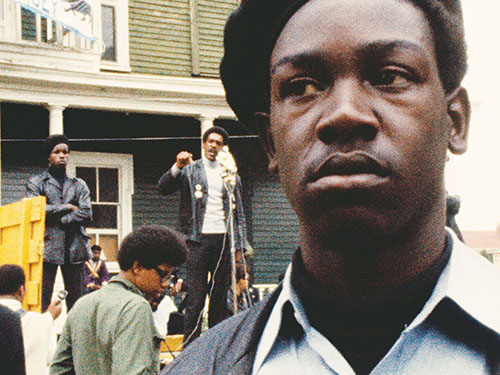
“The Black Panther Party (BPP) embodied this new mixture of cultural and political rebellion. Varda would often travel from Los Angeles to Oakland, filming Black Panther meetings and demonstrations with a 16mm camera borrowed from student activists at the University of California, Berkeley. The resulting documentary, Black Panthers (1968), captures the complexity of the Party, with its blend of personal, domestic and international politics. The film opens with the words ‘Black is Honest and Beautiful’ alongside footage from a rally to free Huey Newton, the co-founder and Minister of Defense of the BPP, who was in jail for the killing of Oakland police officer John Frey following a shoot-out after being pulled over in traffic. Varda’s camera focuses on the energy of the crowd – particularly the young children – clapping and dancing as the singer sings, ‘We didn’t come here on our free will/Our people was sold…. The truth about the whole thing, children, never been told.’ He continues: ‘You got to get that starch and iron out of yo’ hair/Wigs and straightenin’ combs ain’t gonna get you nowhere.’ Varda, in an off-screen voiceover, explains to her French audience: ‘This is neither a picnic nor a party in Oakland. It’s a political rally organized by the Black Panthers – black activists who are getting ready for the revolution’.”
Beth Mauldin1
“Newton’s imprisonment was the project’s catalyst, but, as the title suggests, Black Panthers is concerned primarily with the organization as a whole: the social changes it demands – an end to police brutality, exemption from military service for black men, just trials for black people by juries of their peers, education reform – and the shifts in African American self-identification and individuality it evinces, as exemplified, for one thing, by the natural hairstyles worn by many of the film’s subjects. Though one could see the white and newly-arrived-in-America Varda as a detached observer, there’s a universality and an empathy to her film that keep it from exoticizing its subjects. As she revealed in a 1977 interview, she considers Black Panthers to be a crucial moment for her political thinking, one that revealed for her parallels between the black power and feminist movements: ‘The Black Panthers were the first to say, “We want to make the rules, the theory.” And that’s what made me aware of the woman situation. A lot of good men had been thinking for us.’ As her career continued, she would make more overtly feminist films, such as One Sings, the Other Doesn’t (1977). So even Black Panthers, a film seemingly far removed from the filmmaker’s own experience, is a personal statement, fitting well into the pattern of a multifaceted movie career.”
Michael Koresky2
- 1Beth Mauldin, “Black Panthers,” Senses of Cinema, June 2014.
- 2Michael Koresky, “Eclipse Series 43: Agnès Varda in California,” Current (Criterion Collection), 13 August 2015.

